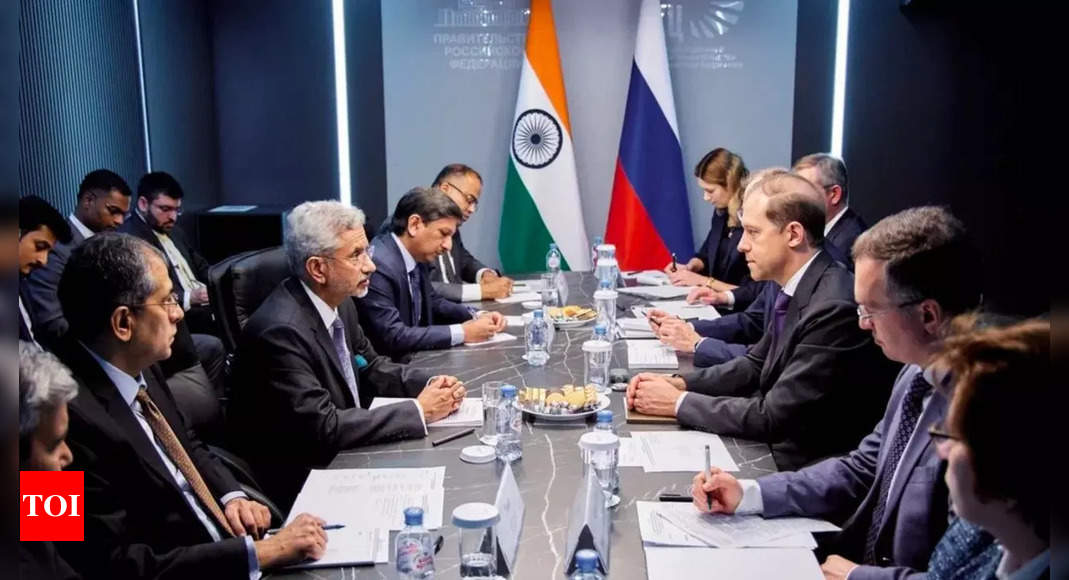[ad_1]
India and Russia have signed important agreements related to the construction of future power generating units at the Kudankulam nuclear power plant in Tamil Nadu. External Affairs Minister S Jaishankar made the announcement during his visit to Russia. Jaishankar had a productive meeting with Deputy Prime Minister Denis Manturov on bilateral economic cooperation. The agreements were signed in the areas of nuclear power, medicines, pharmaceutical substances, and medical devices.
The Kudankulam nuclear power plant, being built with Russia’s technical assistance, began construction in 2002. The first power unit has been operating at its design capacity of 1,000 MW since February 2016. The plant is expected to reach full capacity in 2027.
During the meeting, Jaishankar highlighted the progress made in trade, finance, connectivity, energy, civil aviation, and nuclear domains. He expressed appreciation for the focus on exploring new opportunities and discussed the need for balanced and sustainable cooperation.According to a PTI report, Jaishankar emphasized Russia’s role as a “special partner” in defence, nuclear power, and space collaborations, while addressing the Indian community,. “Collaborations are done in areas of defence, space and nuclear [energy] with countries with which you have a high degree of trust,” he was quoted as saying.
He also mentioned that negotiations on a free trade agreement between India and the Eurasian Economic Zone will begin in-person by the end of January.
Jaishankar expressed confidence in India’s growing economy and influence, stating that it has risen from the 10th largest economy a decade ago to the 5th largest today.
On Wednesday, Jaishankar will meet with Sergey Lavrov, his Russian counterpart, to discuss bilateral, multilateral, and international issues. He expressed optimism about the future of the India-Russia relationship, highlighting the growing Russian focus on Asia as a reason for increased trade.
The Kudankulam nuclear power plant, being built with Russia’s technical assistance, began construction in 2002. The first power unit has been operating at its design capacity of 1,000 MW since February 2016. The plant is expected to reach full capacity in 2027.
During the meeting, Jaishankar highlighted the progress made in trade, finance, connectivity, energy, civil aviation, and nuclear domains. He expressed appreciation for the focus on exploring new opportunities and discussed the need for balanced and sustainable cooperation.According to a PTI report, Jaishankar emphasized Russia’s role as a “special partner” in defence, nuclear power, and space collaborations, while addressing the Indian community,. “Collaborations are done in areas of defence, space and nuclear [energy] with countries with which you have a high degree of trust,” he was quoted as saying.
He also mentioned that negotiations on a free trade agreement between India and the Eurasian Economic Zone will begin in-person by the end of January.
Jaishankar expressed confidence in India’s growing economy and influence, stating that it has risen from the 10th largest economy a decade ago to the 5th largest today.
On Wednesday, Jaishankar will meet with Sergey Lavrov, his Russian counterpart, to discuss bilateral, multilateral, and international issues. He expressed optimism about the future of the India-Russia relationship, highlighting the growing Russian focus on Asia as a reason for increased trade.
Jaishankar appreciated the contribution of the Indian community in strengthening collaboration between India and Russia. He encouraged their continued involvement in promoting mutually beneficial cooperation. He also visited the Russian Industry and Trade exhibition, which showcased Russia’s contemporary capabilities and potential for collaboration between the two countries.
Despite Russia’s invasion of Ukraine, the ties between India and Russia remain strong. India has maintained its stance of resolving the crisis through diplomacy and dialogue. India’s import of Russian crude oil has increased despite concerns expressed by Western countries.
[ad_2]
Source link


